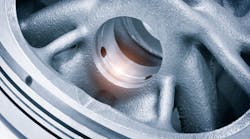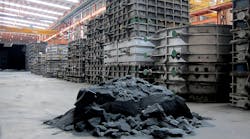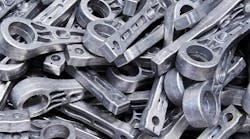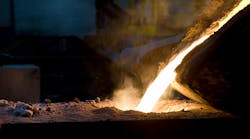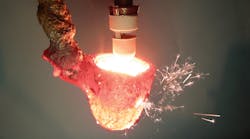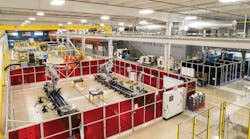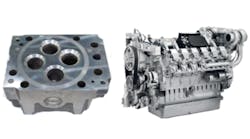Tupy, one of the world’s largest ferrous foundry groups, has started series production of compacted graphite iron cylinder heads for the new version of the MTU Series 2000 diesel engine at its automotive foundry in Joinville, Brazil. The engines are manufactured by MTU Friedrichshafen GmbH, a subsidiary of Rolls-Royce Power Systems AG, and have been redesigned for greater fuel economy and lower lifecycle costs, helping to achieve compliance with EPA 4I requirements.
The CGI cylinder head was specified to allow the redesigned engines to achieve higher power output, with durability for demanding duty cycles needed by marine, mining, construction, and stationary diesel power engines.
CGI is a lightweight alternative to gray iron and aluminum for automotive components. The process that SinterCast developed is the most widely used for commercial CGI production, with over 50 automotive parts, from 2 kg to 17 mt, in production worldwide.
Stationary power engines represent an emerging opportunity for CGI production, according to SinterCast AB president and CEO Dr. Steve Dawson. "At present, industrial power components and products other than automotive cylinder blocks and heads comprise approximately 10% of our production volume,” Dawson said. “We are confident that the growth opportunities in the industrial power sector can allow us to maintain this balance as the core automotive block and head sector continues to ramp up."
Among SinterCast’s largest customers is Tupy, which with the new MTU Series 200 cylinder heads has 18 CGI parts in series production. Overall, Tupy has an installed capacity of 848,000 metric tons of cast iron at two large foundries in Brazil and two in Mexico.
"The MTU order represents another important step forward for CGI and for Tupy, and further reinforces the transition toward CGI in state-of-the-art engine applications,” stated Luiz Tarquínio, president and CEO of Tupy.
At the Joinville foundry, the new cylinder heads are produced in three different configurations, as necessary for the new engine designs different configurations (12-V, 16-V, and 18-V.)
"The MTU Series 2000 cylinder head provides yet another example of the contribution provided by CGI in achieving performance, durability, refinement and emissions targets," according to Dr. Dawson.
